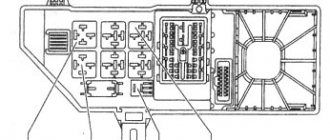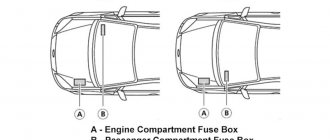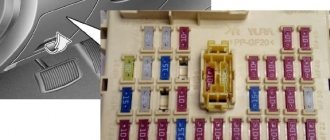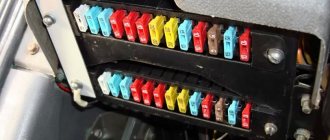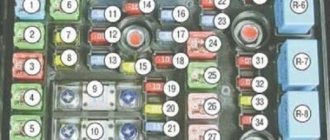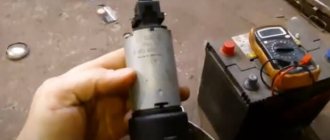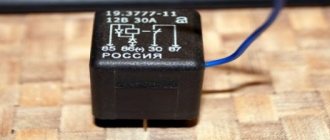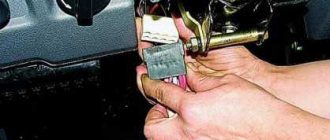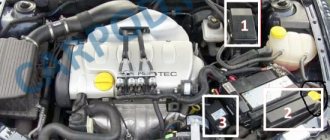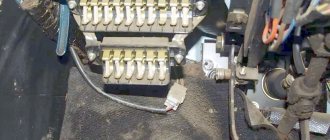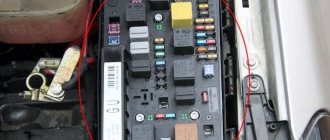The dimensions of the Gazelle are almost the same for all models. All the differences come down mainly to the switches. On the first models of Gazelles type 3302, switching is carried out by the central light switch. Subsequent models were equipped with lighting control units. The operating principle of these modules boils down to the closure of certain contacts when the control handle is turned. The connection diagram for Gazelle 3321 is somewhat different. They use an intermediate relay to unload the switch contacts. This would not hurt to do business with Gazelles, but the designers considered it unnecessary.
Gazelle dimensions diagram.
The dimensions of the Gazelle are almost the same for all models. All the differences come down mainly to the switches. On the first models of Gazelles type 3302, switching is carried out by the central light switch. Subsequent models were equipped with lighting control units. The operating principle of these modules boils down to the closure of certain contacts when the control handle is turned. The connection diagram for Gazelle 3321 is somewhat different. They use an intermediate relay to unload the switch contacts. This would not hurt to do business with Gazelles, but the designers considered it unnecessary.
Blocks under the hood
Relay and fuse box
Located on the left side, in the back.
Scheme
Purpose
| F1 | 15A Fog lamp relay |
| F2 | 10A Brake lights |
| F3 | 20A Horn relay (bus) |
| F4 | 25A Fuel heater relay (diesel engine vehicle) 20A Main relay (petrol engine vehicle) |
| F5 | 25A Coolant heater (diesel engine vehicle) 5A Engine control unit (gasoline engine vehicle) |
| F6 | 15A Fuel pump (gasoline vehicle) 25A Starter and instrument switch (bus) |
| F7 | 25A Anti-lock brake system ABS |
| F8 | 25A Air conditioning fan 20A Independent heater (bus) |
| F9 | 10A Low beam (left headlight) |
| F10 | 10A Low beam (right headlight) |
| F11 | 10A High beam (left headlight) |
| F12 | 10A High beam (right headlight) |
| F13 | 10A Side lights (left side) |
| F14 | 10A Side lights (right side) |
| F15 | 10A Reversing light |
| F16 | 10A Air Conditioning Compressor |
| F17 | 40A Heater |
| F18 | 40A Anti-lock braking system ABS |
| F19 | 40A Instrument and starter (ignition) switch |
| Relay | |
| K1 | A/C compressor relay |
| K2 | Starter Interlock Relay (Diesel Engine) Fan Clutch Relay (Gasoline Vehicle) |
| K3 | Fuel pump relay (petrol vehicle) |
| K4 | Fog light relay |
| K5 | High beam relay |
| K6 | Low beam relay |
| K7 | A/C Fan Relay |
| K8 | Wiper blade relay |
| K9 | Fuel heater relay (diesel engine) |
| K9 | Main relay (petrol vehicle) |
| K10 | Starter relay |
Fuse box
It is located under the hood, on the right side of the front panel, and consists of fusible links.
Diesel models
Scheme
Decoding
| 1 | 125A Air preheater |
| 2 | 90A Common positive circuit of the vehicle |
| 3 | 40A Reserve |
| 4 | 30A Engine control system |
Gasoline models
Photo - example
Description
- 90A Common positive circuit of the vehicle
- 60A Reserve
Gazelle dimensions diagram check.
Rear lights do not light up
What to do if the Gazelle’s dimensions do not light up completely, or some individual lamps? Most often, the rear lights on gazelles do not light up. If this happens, then first you need to check the simplest thing, the presence of power in the sockets and the serviceability of the lamps. If there is no plus, you need to check the condition of the contacts in the connector; for on-board gazelles this is the most problematic place.
The fact is that the size wire has constant power while driving, since according to traffic rules, all cars drive with their headlights on. Despite the protective rubber bands, water gets into the connector and, under the influence of electrolysis, the metal of the contacts is destroyed very quickly. This can be determined by the green coating in the connector. On minibuses, the connection is made in the cabin and they are practically indestructible.
But there is one more problem area that is characteristic of absolutely all Gazelles. The fact is that the rear part of the wiring has a connection of wires in the area of branching into the right and left sides. This place is also highly susceptible to electrolysis destruction, since water, getting under the insulation, remains there and constantly affects the wires. But before you go there, check that there is power in the front harness connector and the rear harness connector. These connectors are located in the engine compartment in the area of the vacuum brake booster and are also exposed to liquids.
Basic recommendations for replacing lamps
In order for the light to be of high quality, you need not only to carry out the work correctly, but also to use high-quality products, let's start with this.
How to choose a quality option
To avoid making mistakes when purchasing, remember a few simple but useful recommendations:
It is important that the product meets the required parameters. The model we are considering uses lamps with an H7 base; the power required is 55 Watt, voltage 12 Volts
Hella products have earned a good reputation among car enthusiasts
It is very important to choose a high-quality option, so low price should in no case be the determining factor; most often, cheap products do not last long and do not work at all as stated. Give preference to well-known brands that have been on the market for a long time. You should not purchase products that do not meet factory requirements.
For example, the use of xenon is contrary to traffic regulations, or if you purchase halogen lamps of too high power, the quality of light is unlikely to improve, but the load on the wiring will increase, which can lead to accelerated wear. (See also the article Gazelle wiring diagram: features.)
The low beam is always located closer to the bumper, the high beam is closer to the radiatorReplacement features
Let us note right away that the process can be complicated by the fact that you will need to stick your hand into the lampshade; if you want to see what is located inside and how, then take a small mirror.
Instructions for doing the work yourself are as follows:
First of all, remove the plug, which covers the connection point of the light bulb and serves as protection against moisture and dust getting inside. Simply pull one of the edges and carefully remove the cover from its seat.
If the cover is damaged, it is better to find a new one, as moisture and dirt will penetrate into the housing
- Next, you need to disconnect the block of wires, this should be done very carefully, in no case do not pull on the wires themselves, grab the connection body and pull it out, sometimes it happens that this element is difficult to remove, in this case do not pull very hard, it is better to loosen it first him, and then he will get it much easier.
- The lamp base holds a special clamp that securely fixes and presses the entire assembly. To release it, you need to press on the rounded side and disengage it from the hook, after which the second side will release itself. This is not very clear in words, so look at the photo below, it clearly shows both the clamp itself and the buckwheat on which it is held.
The spring clip must be pressed and then pulled up, after which the system will be released
You remove the lamp and install a new one in its place; there are special slots on the base, so choosing the correct position will not be difficult. Next, you need to put the clamp in place; to do this, one side is inserted under the hook, and the second is pressed and placed under the other support.
The dimensions on one side do not light up.
When the rear lights on a Gazelle don’t work, we figured it out. If the lights on one side do not light up, then you need to check the fuses and replace the blown ones. If the fuse blows again during installation, there is a short circuit in the circuit. To find it, you need to disconnect the connector of the rear and front harness. This will allow you to determine which harness contains the short circuit. You should do the same in order to eliminate short circuits in headlights and rear lights. The specific location can be determined by examining the corresponding harness.
The front lights do not light up.
Loss of contact of the front dimensions most often occurs in the connectors of the headlight unit. This mainly happens on Gazelles of the first editions. Loss of contacts is possible not only from the outside, but from the inside of the connector. To eliminate the malfunction, it is enough to unscrew one or two self-tapping screws, depending on the design, carefully remove the socket and clean the contacts from the inside. On Gazelles, restyling and business problems in the headlight unit are extremely rare.
The last option is when the Gazelle’s dimensions are not fully activated. You should start checking the Gazelle circuit with the fuses near the battery. On the first models, this practically does not happen unless the contact on the central switch or connected wires loosens. Most often, such a malfunction appears in restyling Gazelles. This is due to the use of a relay in the headlight circuit, through the contacts of which the current also passes to the headlight lamps. In this case, not only the relay fails, but also the socket where it is inserted, especially when the contacts are loosened. The relay is located on a bracket under the panel, on the steering column.
Source
Possibility of cigarette lighter repair
In some cases it is not necessary to change the device. Sometimes the device can be repaired. Below is a table with recommended actions in certain situations.
| Cause of malfunction | Repair options |
| Poor contact | Bend the metal clips inside the cartridge. |
| Presence of oxides or rust | Use a file to remove plaque from contacts. |
| Blown fuse | Replace the element with a new one, with the rating recommended by the manufacturer (15 or 20 amperes) |
| Broken wiring | Check the integrity of the wires using a multitester, solder or replace broken cables. |
| Washer melting | Replacement with a new device. |
| Burnout of the metal spiral | Replacing the cigarette lighter. |
